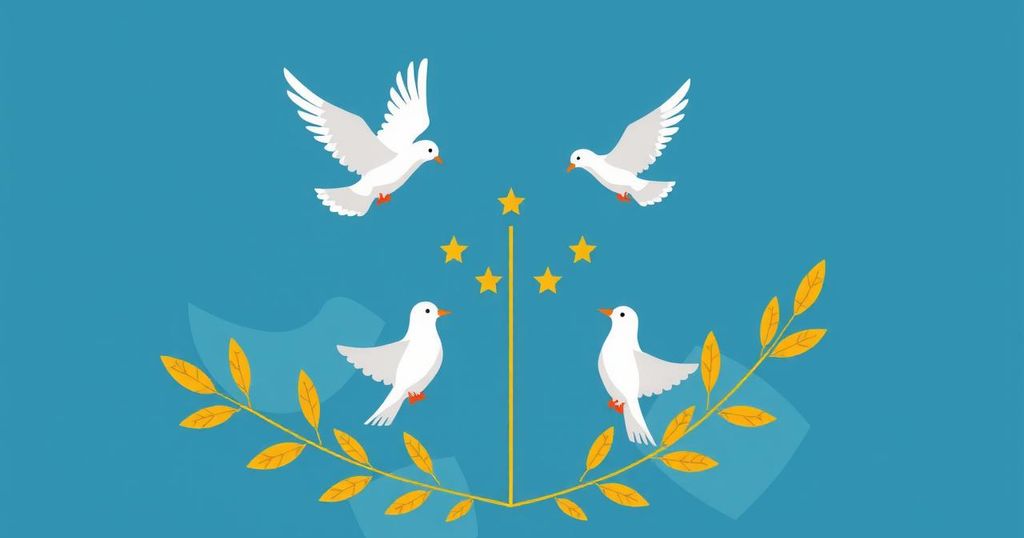Key Takeaways from Europe’s Emergency Summit on Ukraine

European Union leaders convened an emergency summit to address security concerns following U.S. military aid suspension to Ukraine. They committed to increasing defense budgets, ensuring continued support for Ukraine, and discussed forming a coalition of nations for military assistance. The summit reflected Europe’s determination to enhance its military capabilities amid fears of Russian aggression and a changing U.S. foreign policy.
The recent emergency summit in Brussels brought together European Union leaders to address rising security concerns following the suspension of U.S. military aid to Ukraine. The meeting aimed to reinforce Europe’s commitments to security and support for Ukraine amidst fears of diminished American backing, particularly after a contentious meeting between U.S. President Donald Trump and Ukrainian President Volodymyr Zelenskyy.
One significant outcome from the summit was a collective agreement to increase defense spending across Europe. In light of ongoing threats from Russia, EU leaders discussed methods to bolster military capabilities independently of U.S. support. Measures proposed by the European Commission included fiscal reforms and the potential for joint borrowing to assist member states in upgrading their defense budgets.
European leaders, including Zelenskyy and President of the European Commission Ursula von der Leyen, expressed the urgency of these measures. Von der Leyen described this moment as a “watershed moment,” emphasizing the need for Europe to defend itself and support Ukraine effectively. Hungarian Prime Minister Viktor Orban and Luxembourg’s Prime Minister Luc Frieden echoed the necessity to strengthen European defense arrangements despite differing opinions among EU member states.
Zelenskyy received robust backing from his European counterparts at the summit, with discussions surrounding military aid expansions and security guarantees for Ukraine. He expressed gratitude for the continued support, stating that it signaled Ukraine was not “alone” in its resistance against Russia. Outgoing German Chancellor Olaf Scholz reaffirmed the importance of a fair peace agreement, rejecting any “dictated peace” terms imposed by external powers.
The summit also saw discussions about forming a “coalition of the willing” involving around 20 countries to provide Ukraine with additional support in the event of a peace deal. Nations such as Australia and Ireland have shown interest in contributing military peacekeepers to help enforce a potential settlement, reflecting Europe’s unity in backing Ukraine against Russian aggression.
Military contributions from EU countries are also on the rise. Belgium announced plans to deliver F-16 fighter jets to Ukraine by 2026, while Sweden will send eight Gripen jets to support NATO airspace policing over Poland. Meanwhile, French President Macron suggested extending France’s nuclear deterrent umbrella to EU nations, a proposal met with mixed reactions regarding its implications for EU nuclear policy.
Amid these developments, Russia has firmly opposed the idea of European peacekeepers in Ukraine, framing it as a sign of increased NATO involvement. Russian officials criticized Macron’s remarks about George’s threats to Europe, emphasizing that the Kremlin seeks a peace solution ensuring Russia’s security without compromising its territorial interests.
Moving forward, the EU’s discussions at the summit are critical as leaders aim to transform agreements into actionable strategies for military and economic support for Ukraine while enhancing their own defense systems. Economic experts noted that the shift in U.S. policy could spur increased military investments in Europe, fostering broader economic growth despite the context of conflict.
The emergency summit highlighted Europe’s commitment to bolstering its defense capabilities and supporting Ukraine amidst shifting U.S. policies. Key outcomes included a collective agreement to increase military spending, strengthen the defense framework, and ensure continued support for Ukraine with military aid and security guarantees. Despite internal disagreements over funding and strategic direction, the EU’s unity in confronting Russian aggression remains evident. The focus will now shift to concrete actions needed to support Ukraine effectively while reinforcing European security.
Original Source: www.aljazeera.com







